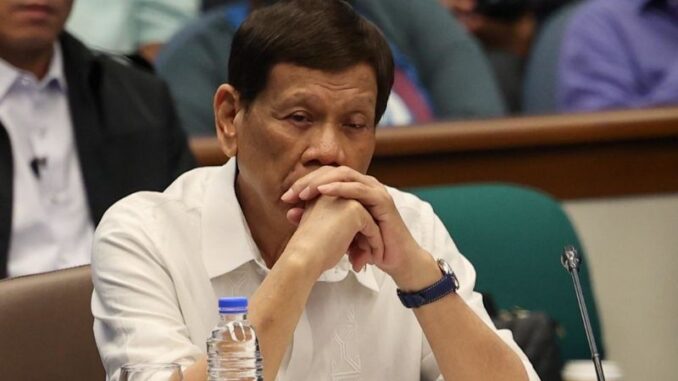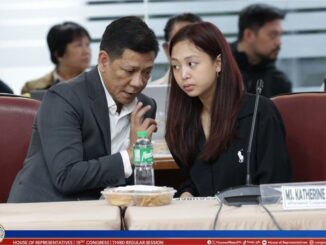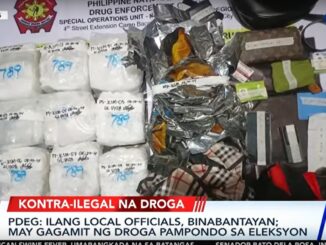
MANILA, Philippines — Former President Rodrigo Duterte’s admission of “shortcomings” in his war on drugs further underscores his liability for crimes against humanity, a House leader said on Tuesday, October 29.
House Committee on Human Rights Chairperson Rep. Bienvenido Abante (Manila, 6th District) argued that the drug war “meets all the elements of willful killing,” citing Republic Act 9851 or the Philippine Act on Crimes Against International Humanitarian Law, Genocide, and Other Crimes Against Humanity.
“This admission is significant as it highlights that cases are now right for filing against those responsible for the extrajudicial killings during the drug war,” he said at a press conference.
This was also in reference to former Sen. Leila de Lima’s recent statement at the House Quad Committee’s ninth public hearing, where also argued that Duterte could face penalties under this law.
It can be recalled that the former president owned up to the consequences of his drug war campaign during the Senate Blue Ribbon Committee’s first hearing on the issue.
Duterte himself said that he should be the one “held accountable and detained” instead of the police who “only followed his orders.”
However, despite this explicit statement, the former president backtracked in his answers to senators’ questions that he is not responsible for the likes of 17-year-old Kian delos Santos who was shot by police during anti-drug operations in 2017.
RELATED: Duterte claims responsibility for drug war but offers no apologies
How is Duterte liable?
Abante outlined four factors that qualify the former president’s drug war as a crime against humanity, beginning with extrajudicial killings that human rights groups estimate have claimed up to 30,000 lives.
Second, he said that most victims were civilians “suspected by police authorities of involvement in drug-related activities” who were denied due process to defend themselves against the allegations.
This led Abante to his third point: testimony from several resource persons, many of whom were Duterte appointees, indicated that the killings occurred as part of a “widespread, systematic attack” nationwide.
Lastly, the human rights committee chairperson said that the EJKs were “executed under a state, organizational policy” which Duterte himself coined as the war on drugs. He added that a possible reward system for police officers who killed drug suspects could be another contributing factor.
“This must be recognized as evidence for all present and future cases on the war on drugs,” Abante said.
Section 8 of Republic Act 9851 identifies who may be held liable for crimes against humanity, including individuals who commit the crime, order or encourage its commission or attempted commission, or act as accomplices.
Meanwhile, Section 10 stipulates that superiors are “criminally responsible as principals for crimes committed by their subordinates” under their effective command and control.
This responsibility arises from either direct command or a failure to prevent the crime, especially if they knew or should have known about it and did not take the necessary measures to stop it.
Rep. Dan Fernandez (Santa Rosa, Lone District), who chairs the House Committee on Public Order and Safety, also cited Section 15 of the same law.
This provision states that Philippine courts, in cases of crimes against humanity, “shall be guided by” international law, conventions and judicial decisions of international courts and tribunals.
Asked whether Duterte should be prosecuted under RA 9851, Fernandez said, “I think it’s only proper that the existing law be followed and that we let the wheels of justice prevail.”
House lawmakers also made it clear that Duterte is not only liable for the EJKs in his drug war but also for institutionalizing violence during his presidency.
‘Normalization of brutality’
Abante did not mince words when he told reporters that Duterte’s remarks at the Senate hearing on Monday, October 28, exhibited a “normalization of brutality.”
“What we witnessed during the former president’s testimony was a shocking normalization of brutality, a normalization of death and a disregard for due process that has infected our legal institutions,” he said.
Abante said the former president’s “nonchalant attitude” toward life is also rooted in the thousands of EJK under his watch.
“His casual language, his swearing in formal proceedings mirrors the erosion of his standards in his administration where the value of life itself was cast aside,” he added.
The lawmaker could not help but say that Duterte’s words and actions carried with them a “disregard for human life” as victims were deprived of the safeguards and due process they should have been given as mere suspects in the illegal drug trade.
Laughter and applause filled the Senate as Duterte spoke at the hearing yesterday — a reaction that, for Abante, reflected the social norms the former president had established.
While Duterte’s foul and explicit words have often been downplayed as jokes, Fernandez said that the lower chamber will not tolerate this should the former president attend the Quad Comm hearings.
“If the former president curses in the Senate and we allow it here, what’s to stop others from making those kinds of statements as well?” he said in a mix of English and Filipino.
Duterte also “gaslighted” the nation and attempted to “rewrite history” by justifying the killings with the belief that “there will be one less criminal,” Abante said.
“This was not a hearing in the service of truth, it was a forum for denial for him to rationalize the indefensible,” he added.
The former president has yet to make an appearance at the House probe into his war on drugs, which was the first to invite him before the Senate. Duterte was absent on October 22 as he was feeling unwell, according to his legal counsel.
Among the allegations against Duterte include implementing the “Davao Model” nationwide — a reward system for killing drug suspects — and directing police officers to carry out killings of alleged drug lords on his orders.





Be the first to comment